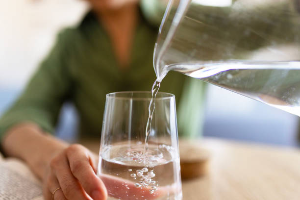Drinking cold water to quench your thirst after exercise is a natural reaction. Especially in summer, after sweating a lot, cold water becomes even more desirable. However, did you know that drinking cold water can negatively impact your recovery and overall health after exercise? In this blog post, we will explore why drinking cold water post-exercise is not advisable and discuss the proper ways to stay hydrated.

Impact of Cold Water on Muscle Recovery
Recovering from muscle fatigue after exercise is crucial. Muscle fatigue occurs when metabolic waste products generated during exercise are not quickly expelled, slowing down the recovery process. Drinking cold water causes blood vessels to constrict, hindering the expulsion of these metabolic waste products through the bloodstream. This can delay muscle recovery.
Importance of Expelling Metabolic Waste
After exercise, muscles accumulate various metabolic waste products, including lactic acid. These waste products need to be quickly removed for muscles to regain normal function. Cold water causes blood vessels to constrict, making it difficult to expel these waste products. As a result, muscle fatigue relief is delayed, taking more time to prepare for the next workout.
Stiffening of Respiratory Muscles
Cold water can temporarily stiffen the muscles that control breathing. This slows down the exchange of oxygen and carbon dioxide in the body, hindering muscle fatigue relief. This is also why you should avoid cold showers immediately after exercise. Cold water constricts blood vessels and reduces blood circulation, slowing down fatigue recovery.
Effects of Cold Water on the Stomach
Drinking cold water after exercise can also negatively affect your stomach. Post-exercise, stomach function tends to be lower than usual because blood is concentrated in the muscles, reducing blood flow to the stomach and other digestive organs.
Indigestion and Stomach Pain
In a state of reduced stomach function after exercise, drinking cold water can stimulate the stomach, leading to indigestion, stomach pain, and even diarrhea. The stomach expends energy to warm the cold water to body temperature, decreasing the energy available for digestion. Consequently, digestion function deteriorates further, potentially leading to stomach issues.
Energy Consumption
When you drink cold water after exercise, your body expends additional energy to warm it to body temperature. This reduces the energy available for the digestive process, which can cause digestive problems. Especially after exercise, when your physical strength is already low, this additional energy expenditure is more burdensome on the body.
Proper Hydration Methods
After exercise, it is better to drink lukewarm water rather than cold water. Lukewarm water is quickly absorbed by the body and does not burden the stomach, making it an ideal choice.
Benefits of Lukewarm Water
- Quick Absorption: Lukewarm water is quickly absorbed by the body, replenishing fluids and aiding in fatigue recovery.
- Reduced Stomach Burden: Lukewarm water does not burden the stomach or interfere with digestion.
- Promotes Blood Circulation: Lukewarm water promotes blood circulation, helping to relieve muscle fatigue.
Appropriate Hydration Amount
After exercise, it is recommended to drink 250-300 mL of lukewarm water. This amount quickly replenishes body fluids without burdening the stomach.
Electrolyte Replenishment
If you have exercised for a long time or sweated a lot, it is better to drink electrolyte beverages instead of water. Sweating causes the loss of electrolytes like sodium, and drinking plain water can imbalance the body's electrolyte levels, leading to dizziness or nausea. Electrolyte drinks help maintain this balance, aiding in recovery.
Necessity of Electrolyte Drinks
People who lose 2% of their body weight through sweating during exercise experience fewer muscle cramps when drinking electrolyte beverages instead of water. Electrolyte drinks maintain the body's electrolyte balance and play an important role in promoting post-exercise recovery.
Choosing Electrolyte Drinks
- Sodium Content: Choose drinks that replenish sodium lost through sweat.
- Sugar Content: Appropriate sugar levels replenish energy and help with recovery.
- Potassium and Magnesium: These electrolytes are essential for muscle function. Choose drinks that contain them.
Additional Tips for Post-Exercise Recovery
Beyond drinking lukewarm water instead of cold water, here are a few additional tips to promote recovery.
Stretching
Engage in light stretching after exercise to relax your muscles. Stretching reduces muscle tension and promotes blood circulation, aiding in fatigue recovery.
Sufficient Rest
It is important to take sufficient rest after exercise. Rest allows muscles to recover and restore physical strength. Sleep, in particular, plays a crucial role in fatigue recovery.
Balanced Diet
After exercise, it is essential to replenish nutrients through a balanced diet. Meals that include proteins, carbohydrates, and fats help with muscle recovery and energy replenishment.
Hydration
Adequate hydration is important after exercise. Besides water and electrolyte drinks, consuming fruits or foods with high water content is also beneficial.
Conclusion
Drinking cold water to quench your thirst after exercise may provide temporary relief, but it can negatively impact muscle recovery and overall health. Opt for lukewarm water and, when necessary, consume electrolyte drinks to maintain body balance. Additionally, practice proper stretching, rest, and balanced nutrition to promote post-exercise recovery. Healthy exercise habits and proper hydration will lead to more effective workout results.
'생활백서' 카테고리의 다른 글
| 미지근한 물의 재발견, 운동 후 찬물을 벌컥벌컥 마시면 안 되는 이유에 대해 알아보자. (61) | 2025.02.09 |
|---|---|
| 못난이 발가락을 관리하는 법, 발톱 무좀의 원인과 치료방법에 대해 알아보자. (54) | 2025.02.09 |
| How to Manage Unsightly Toes and Learn About the Causes and Treatments of Toenail Fungus. (52) | 2025.02.09 |
| Healthy Habits for Well-being: Protect Your Health with a Glass of Water. (52) | 2025.02.09 |
| 암환자들의 희망, 중입자 치료에 대해 알아보자. (60) | 2025.02.09 |



